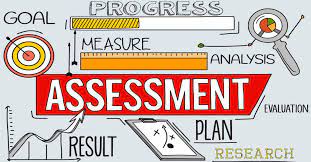Assessment
At Aughton St Michael’s C.E Primary School we are committed to providing relevant and timely feedback to pupils both orally and in writing. We believe that assessment should be used to improve learning and should:

- Draw attention to what children need to do to improve.
- Provide feedback on what they have done so far.
- Engage the children so they are part of the assessment process.
- Inform subsequent lessons and planning to meet the children's needs
We therefore assess pupils' progress in a number of different ways:
Formative assessment
The aim of formative assessment is for staff to give timley and focused feedback to the children. This may be within the lesson or at the start of the next lesson and shoudl celebrate the successes in the work as well as giving achievable targets to improve the work. These improvemnts may be as a 'fix it' task where the chidlren edits their work in purple to improve it or as a specific objective/target for them to achieve in the next task.
Summative assessment
In order to track pupils' progress and to check on their retention of previous learning, pupils are formally assessed in Reading and Maths three times through the year (at the end of each term). Writing assessments are updated as the children move through their learning. At the end of each term, a judgement is made against age-related expectations for Reading, Writing and Maths using these assessements and in light of their day-to-day responses. This is then communicated to parents in an end of term report. For other subjects assements are made at the end of each unit and an overall judgement against age-related expectations is made at the end of the academic year and communicated to parents in the end of year report.
The judements are:
- Working towards age-related expectations: This judgement is awarded where children are unlikley to satisfy the demands of their age-related expectations by the end of the academic school year. At times, children who are working towards age-related expectations may receive additional support through a specific intervention or through in-class group support with teachers or teaching assistants. Where children's performance is significantly below that of age related expectations, external professionals may assist in investigating whether the child has any specific barriers to learning which may inform future practice.
- Working at age-expected standard: This judgement illustrates that the child is performing within the expected boundaries for their age. Typically, most pupils will be working at age-expected standards.
- Working above age-related expectations: Pupils who are awarded this judgement are consistenly performing above the expectations of a child of their age. They show greater flair in their work and can utilise a range of different features with great precision. Few children nationally will be working at this level.
Foundation Baseline Assessment
What is the reception baseline assessment?
The reception baseline assessment is a national assessment that is administered in reception classes in all primary, infant and first schools in England. This forms the baseline for primary progress measures, allowing schools to receive credit for the progress their pupils make throughout their time in primary school.
Why has it been introduced?
Historically, a key measure of how well a primary school is serving its pupils is the progress that they make between the end of key stage 1 (year 2) and the end of key stage 2 (year 6). This allows the government to take account of the fact that schools face different challenges given their pupils’ starting points. The reception baseline assessment provides a snapshot of where pupils are when they arrive at school, enabling a new starting point to measure the progress that they make by the end of year 6. It also enables the Department for Education (DfE) to remove statutory end of key stage 1 assessments, as they are no longer the starting point for progress measures.
An information video for parents about the reception baseline assessment (RBA) can be found here. This will provide information to help you, as parents, to understand a little more about what the assessment is, how it is carried out and why it was introduced
Statutory Assessments
What are the statutory assessments my child will undertake during their time at primary school?
As a requirement of the National Curriculum, Year 2 and Year 6 pupils take their end of key stage SATs in May of each year. These tests provide the data which is then verified and used in national comparisons. The complete set of statutory tests are:
- EYFS: Reception Baseline Assessment. This is an IT programme which the children complete.
- Year 1: Phonics Screening Test. These test is administered and marked internal by school staff and then reported to the Department for Education.
- Year 2: Reading (2 papers), Mathematics (2 papers). These papers are marked internal and used as a source of evidence for Teacher Assessment which is submitted to the Department for Education. Writing is teacher assessed therefore pupils do not sit a writing test. Evidence is gathered throughout the course of the year and verified by external moderators.
- Year 4: Multiplication Tables Check (MTC) This test is an IT programme which the children complete.
- Year 6: Reading (1 paper), Mathematics (3 papers), English Punctuation, Spelling & Grammar (2 papers). These tests are marked externally and the results are sent back to school. Writing is teacher assessed therefore pupils do not sit a writing test. Evidence is gathered throughout the course of the year and verified by external moderators